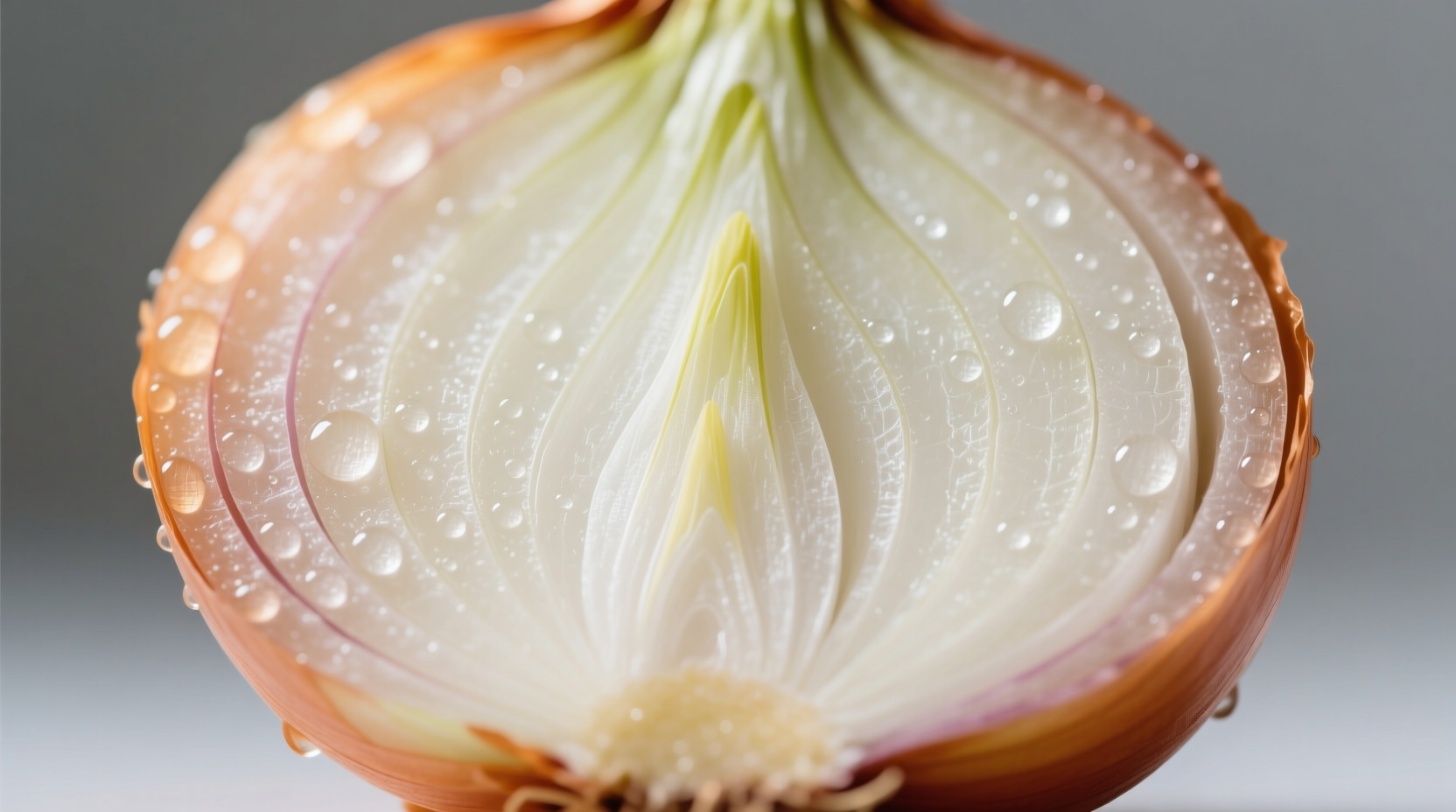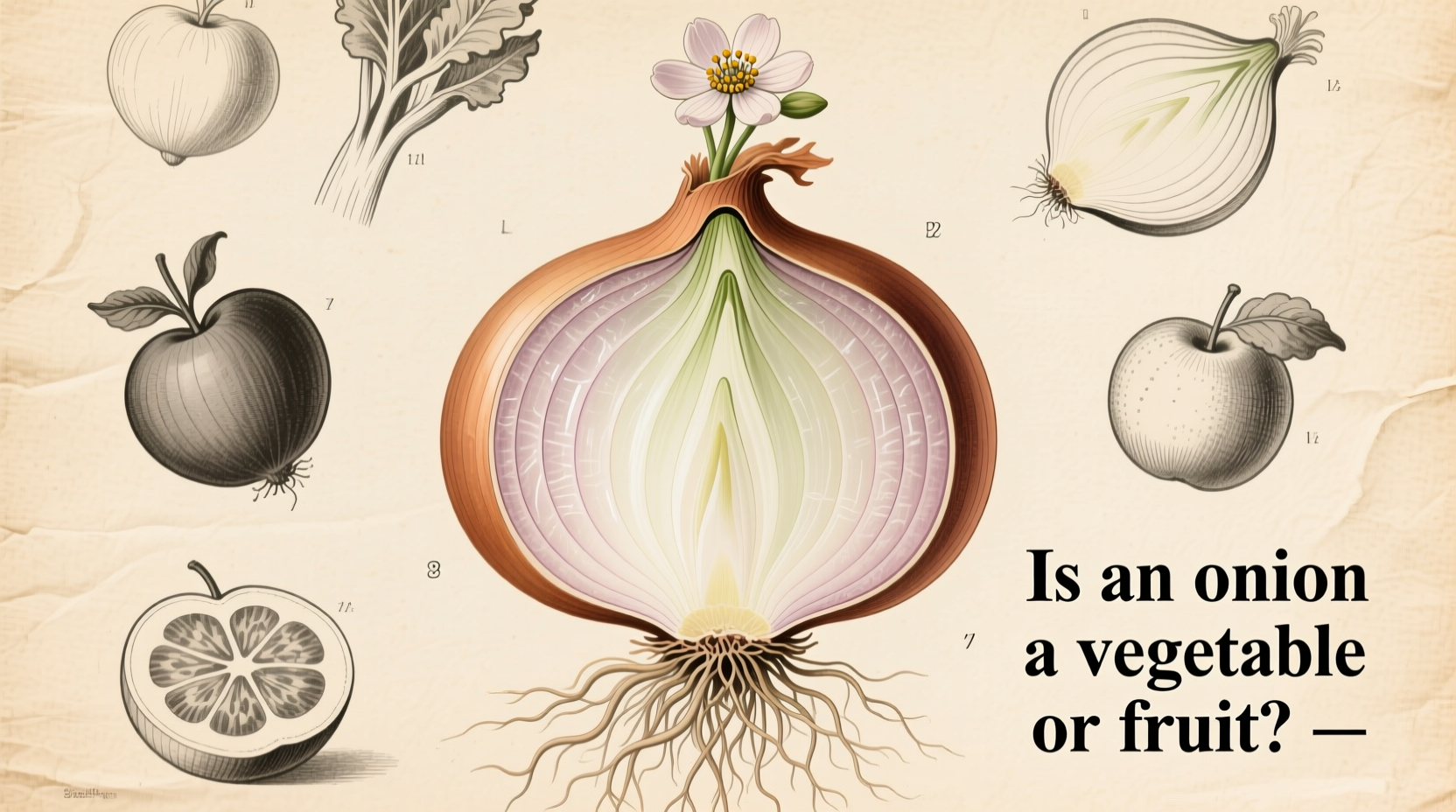Yes, onions are vegetables—specifically bulb vegetables—not fruits. This classification is based on botanical science: onions develop from the plant's stem tissue as underground storage organs, while fruits must form from a flower's ovary and contain seeds. Understanding this distinction helps home cooks and gardeners make better culinary and agricultural decisions.
Why Onions Are Vegetables: The Botanical Breakdown You Need
When you chop an onion for your favorite recipe, you're working with a vegetable—not a fruit. This isn't just culinary opinion; it's established botanical fact. Onions (Allium cepa) belong to the vegetable category because they're modified underground stems called bulbs, which store nutrients for the plant's growth cycle. Unlike fruits, onions don't develop from the flowering part of the plant or contain seeds within their edible portion.
The confusion often stems from how we use foods in cooking versus their scientific classification. While tomatoes and cucumbers are botanically fruits (they develop from flowers and contain seeds), they're culinarily treated as vegetables due to their savory flavor profiles. Onions, however, are vegetables both botanically and culinarily—they develop from stem tissue and contribute savory depth to dishes.
Vegetable vs. Fruit: Clearing Up the Classification Confusion
Let's clarify the fundamental difference that determines whether a food is a vegetable or fruit:
| Characteristic | Vegetables | Fruits |
|---|---|---|
| Botanical Origin | Stems, roots, leaves, or bulbs | Develop from flower ovary |
| Seed Position | No seeds in edible part | Seeds contained within |
| Taste Profile | Typically savory | Typically sweet |
| Onion Classification | Bulb vegetable (stem tissue) | Does not qualify |
This distinction explains why onions are vegetables while tomatoes—despite being used similarly in cooking—are technically fruits. The USDA and agricultural authorities consistently classify onions within the vegetable food group for dietary guidelines, reinforcing their status as vegetables in both scientific and nutritional contexts.
When Classification Matters: Practical Implications for Cooks
Understanding that onions are vegetables isn't just academic—it affects how you use them in the kitchen and garden:
- Cooking applications: As vegetables, onions caramelize beautifully when cooked slowly, developing complex savory-sweet flavors that fruits typically don't achieve
- Gardening considerations: Onion bulbs require different soil conditions and harvesting techniques than fruit-bearing plants
- Nutritional planning: Onions contribute vegetable-based nutrients like vitamin C and antioxidants without the higher sugar content of most fruits
- Storage practices: Proper vegetable storage (cool, dry conditions) preserves onion quality better than fruit storage methods
Professional chefs like those at the Culinary Institute of America emphasize that recognizing onions as vegetables helps cooks understand their behavior in recipes. Unlike fruits, onions don't break down into mush when cooked but instead soften while maintaining structure—making them ideal for building flavor foundations in sauces, soups, and stews.
The Historical Context: How We've Understood Onion Classification
Our understanding of plant classification has evolved significantly over time:
- Ancient civilizations: Egyptians, Greeks, and Romans treated onions as vegetables based on usage, though they lacked modern botanical understanding
- 18th century: Carl Linnaeus established the modern classification system, identifying onions as Allium cepa within the vegetable category
- 19th century: Botanical science confirmed that bulb structures like onions develop from stem tissue, not floral parts
- 20th century: USDA and international agricultural bodies standardized vegetable classification for dietary and agricultural purposes
This historical progression shows why the question "is an onion a vegetable or fruit" persists—early classification was based on culinary use rather than botanical science. Modern understanding combines both perspectives, recognizing onions as vegetables in every meaningful context.
Common Misconceptions About Onion Classification
Several myths contribute to the confusion about whether onions are vegetables or fruits:
- Myth: "If it's not sweet, it's a vegetable"—Reality: Some vegetables like sweet corn have natural sugars, while some fruits like tomatoes are used as vegetables
- Myth: "All underground plant parts are roots"—Reality: Onions are bulbs (modified stems), while carrots are true roots
- Myth: "Botanical classification matters most in cooking"—Reality: Culinary usage often overrides botanical accuracy (e.g., tomatoes as vegetables in cooking)
The key distinction for onions is that their entire edible portion develops from stem tissue, with no involvement of the plant's reproductive system. When an onion plant flowers (which happens when it "bolts"), the actual seeds form in the flower head—not in the bulb we eat.

Practical Takeaways for Home Cooks and Gardeners
Now that you understand why onions are vegetables, here's how to apply this knowledge:
- When cooking: Treat onions like other vegetables—sauté them first to build flavor foundations rather than adding them like fruits
- When gardening: Plant onions in well-drained soil with proper spacing for bulb development, unlike fruit-bearing plants
- When storing: Keep onions in a cool, dry, dark place (like other vegetables), not refrigerated like many fruits
- When shopping: Select firm, dry bulbs without sprouts for best vegetable quality and storage life
Understanding that onions are vegetables helps explain why they behave differently in recipes than fruits. Their cellular structure, sugar content, and response to heat all align with vegetable characteristics, making them indispensable for creating savory dishes across global cuisines.
Related Classification Questions Answered
While onions are clearly vegetables, other foods create similar classification questions:
- Tomatoes: Botanically fruits (develop from flowers with seeds), but culinarily treated as vegetables
- Cucumbers: Also botanically fruits but used as vegetables in cooking
- Peppers: Botanically fruits (contain seeds), though bell peppers are used as vegetables
- Okra: Botanically a fruit (contains seeds), but used as a vegetable
The key difference with onions is they're vegetables in both botanical and culinary contexts—a distinction that matters when understanding how to grow, store, and cook with them effectively.











 浙公网安备
33010002000092号
浙公网安备
33010002000092号 浙B2-20120091-4
浙B2-20120091-4